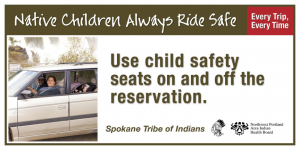Our research showed that community-specific media campaigns were effective for Tribes. Here are a few tips to make your message community-specific:
Recruit community members to be models, actors, and actresses:
You should use images of those who many people in your community recognize. At the very least, the models, actors, and actresses should look like they’re from your community.
Use someone notable and respected in the community, like:
o A respected Tribal elder
o A family who is active in the community
o An adorable child everyone knows
o A local celebrity
Please note: If you are taking photos or videos, you need to have the necessary permission to use people’s images. If you are taking any photos or videos of people, they all must give their consent. Here is a Model Release Form you can use for photo/video consent. You can use this for both adults and minors. For more information on model consent, please visit the American Society of Media Photographers resources page.
Use local imagery: Try to use images that show a familiar place that is recognizable by nearly everyone in your community. This may be a mountain, river, meadow, even a familiar building. This helps viewers see the message as coming from their own communities and encourages them to open their minds to your message.
 At the Spokane Tribe we used a photo of a waterfall that bordered the reservation. That way all community members would recognize and correspond to our message to use child safety seats on the reservation.
At the Spokane Tribe we used a photo of a waterfall that bordered the reservation. That way all community members would recognize and correspond to our message to use child safety seats on the reservation.
Use graphics that depict community elements. The graphics should show common elements that pertain to your community. For the Salish Tribes, we used graphics of salmon, cedar basketry, huckleberries, and canoes. For the Shoshone-Bannock Tribes, we showed beadwork, buffalo, sage, and teepees.
Use recognizable and relevant voices. For radio and television spots, try to find a local voice that your target audience will identify with. Young parents may not respond to the same voice or reading level that you would use with Tribal council members. So you may have to use more than one voice. You can see specific examples in the next topic.
Tailor the message to the audience’s lifestyle. It’s your job to help the consumer see and understand the message. For example, busy parents will need short, important information that gets to the point. Elders may not connect with high-energy messages like a younger audience would. And young people may need messages that speak to their level. Remember to always think about your community and what reading level is appropriate for your messages.
